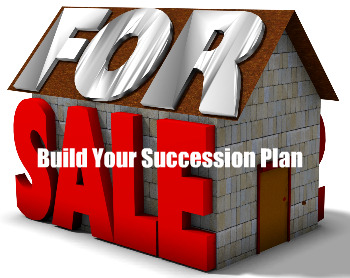Home Page | Blog | Managing | Marketing | Planning | Strategy | Sales | Service | Networking | Voice Marketing Inc.
Succession Plan: A Necessity for a Successful Exit from Business
Understand Succession Definition
The lack of a succession plan is one reason for small business failures (particularly failures of those businesses that are past the start-up or introductory phase of their life-cycle). Without effective succession planning, your business may not survive. Develop a customized succession definition; one that is designed specifically for your operation.
Search This Site

A Succession Definition:
It is about preparing to hand over control, ownership and/or management of the business to someone else.
Small businesses need a plan for succession because they are even more vulnerable to business continuity and employee retention issues. With a small business, there are simply fewer people to train for succession.
The challenges in a family business are even greater: who should succeed the CEO or President (usually the head of the family)? Some families go through significant turmoil trying to organize the succession as the owner plans his or her departure. This fragments the company; and for many organizations has resulted in, at worst, a high number of small business failures and, at best, higher costs.
Effective succession needs to be part of all strategic plans because every business owner eventually wants to retire or eventually leaves the business.
As the owner of the organization that you built up, you won't want to be one of the small business failures or statistics. You will want to make sure that your business is in good hands as you leave. To do that you must plan ahead.
Effective Succession Planning:
How will you transfer ownership of your company?
- Will you sell your business to an employee or employees?
- Will you sell or give your business to family?
- Will you sell your business on the open market?
- Will you shut down your operation and simply sell your assets?
- Do you have a buy/sell agreement with your partner(s) (if you have partners)? If not, will you still want to sell your share to your partner(s); and will they want to buy?
These are all questions that can be, and should be, answered in your planning.
Your plan needs to be part of your business exit strategy, which is also part of your strategic plan. Succession needs to be planned well in advance of your retirement or your exiting your business - 5 to 7 years before you plan to leave is common.
Succession management is a strategy of every well-run business. Effective succession provides for a seamless transition from you to the new owners.
Selling Your Business:
If you plan to sell your operation to one or more employees, you will need to develop the employee to take on additional responsibilities. Ensure that you are recruiting employees with eventual succession in mind - hire the right people! You may wish to provide access to an outside training program.
You will also need to build a successful network to help you and your succession candidate learn more about the industry, and get support for the transfer of knowledge and transition from one leader to another.
Succession Plan for Family Succession

Family succession can be the most challenging because there are usually emotions involved. Many family businesses do not survive the leaving of the founder due to family issues, infighting, or lack of the necessary skills to lead.
For example, which one of the children should be left in charge? Often the oldest feels he or she should be in charge. It is best to deal with this issue long before you exit your business. You may wish to leave one child in charge, but give (or sell) equal (or even unequal - depending on the contribution to the organization) shares of the company to all the children.
You can work with a family business specialist to assess the strengths and weaknesses of family members who work in the business. The best interim approach might be to hire a general manager to run the business and work to develop the family members for added and growing responsibilities.
This management development will take time and should be started well in advance (5 to 10 years - yes, it takes time) of your plans to exit.
Small Business Failure Can be A Result Of Poor Succession Timing:
Whomever you plan to be your successor, have them shadow you in the last year or two.
Make sure that whatever succession or exit strategy you follow that you get the advice of a good lawyer and a good tax accountant.
The lawyer will help you deal with the sales and/or share agreement and transfer; and the accountant will help you develop strategies to minimize the tax burden and handle the transfer of ownership transaction.
Planning for an effective and successful succession
is important to your business; include your plan
in your business exit strategy.
More-For-Small-Business Newsletter:
For more timely and regular monthly information on managing your
small business,
please subscribe here.
Additional Reading:
Return from Succession Plan to Small Business Plan.
Human resource planning needs to be part of succession planning process.
Ensure your Business Financial Plan includes a provision for training and development of key employees.
Build your Business Continuity Resources and Business Continuity Plans.
Include continuity strategies in your Business Operations Plan.
Or return to More For Small Business Home Page.
Subscribe to
More Business Resources E-zine
Implement Your Plan: for Results

Once you've built your plan, you need to implement it.
Developing your strategy (in the plan) is the first, necessary, step. You need to know the direction you want to go, and you need the strategy and the plan to help you get there.
But once you've built the plan, you must execute it.
There is no value in building a plan that just gathers dust.
When building your business plan, make sure that you include an action plan for the strategies, techniques and tactics.
The actions need to include who's responsible for doing what; measurements for success (such as deadlines and timelines, targets and goals, costs, etc.); and why you need to take the action (in some cases, one action needs to be accomplished before subsequent ones can be launched).
As you work through the plan, make sure that you build reporting periods into the implementation: you need to know what's going on and why something is working, or not.
Make sure to communicate progress, or lack of it, throughout the organization. And re-visit the plan when and where necessary.
This Site
Focus on Your Plan

Plan for the future: lots of business owners want to get, or keep, moving forward. Planning seems to be more of a passive activity.
However, to ensure that your business goes in the right direction and that it optimizes all its opportunities, and manages its challenges, it is important to plan.
Balance your activities against the plan: make sure that you are investing your time, and money, on the elements of your business that will help you succeed.
Measure what works, and what doesn't work, and keep your focus: use your business plan as a map to guide you in the direction you want to go.







